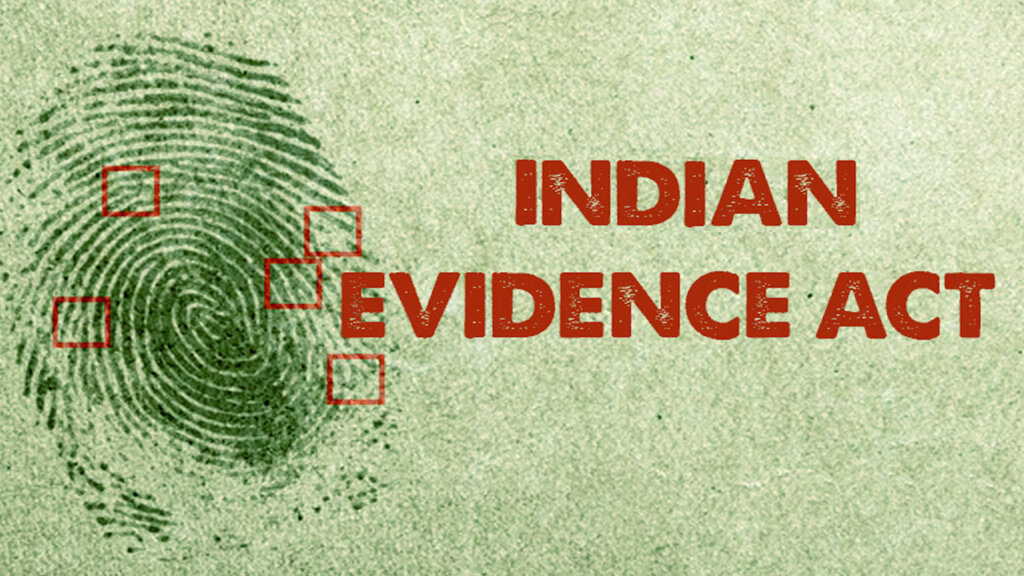The Indian Evidence Act of 1872 is a fundamental legislation that governs the rules and principles pertaining to the admissibility, relevance, and weight of evidence in Indian legal proceedings. Enacted during the British colonial era, this statute forms an integral part of the Indian legal system and plays a crucial role in ensuring a fair and just trial by providing a systematic framework for the evaluation and presentation of evidence. In this comprehensive overview, we will delve into the key provisions, functions, and significance of the Indian Evidence Act of 1872.
Historical Context and Enactment:
The Indian Evidence Act of 1872 was enacted by the British colonial government as part of its efforts to establish a uniform and codified legal system in India. Prior to its enactment, the legal landscape in India was marked by diverse and often conflicting evidentiary rules derived from various religious, customary, and regional practices. The British colonial administrators recognized the need to streamline and standardize these rules to ensure consistency and fairness in legal proceedings.
The Act was largely based on the English Law of Evidence, incorporating principles from English common law and adapting them to the Indian context. It came into force on September 1, 1872, and has since undergone several amendments to address evolving legal and societal needs.
Structure and Contents:
The Indian Evidence Act is organized into three parts, with a total of 167 sections. These parts and sections cover a wide range of topics related to evidence, its admissibility, and its presentation in court. The Act is structured as follows:
Part I: Relevancy of Facts (Sections 1-55)
This part of the Act lays down the fundamental principles governing the relevancy of facts in legal proceedings. It defines the circumstances under which evidence is deemed relevant and admissible in court. Key provisions in this part address the definition of relevant facts, facts forming part of the same transaction, and the exclusion of evidence to prove collateral facts.
Part II: Proof (Sections 56-100)
Part II deals with the burden of proof, production of evidence, and the modes of proving facts. It outlines the different ways in which facts can be established in court, such as oral evidence, documentary evidence, and primary and secondary evidence. This part also discusses the concept of presumption, estoppel, and admissions.
Part III: Production and Effect of Evidence (Sections 101-167)
Part III elaborates on the production of evidence, the examination of witnesses, and the rules governing the admissibility of evidence in specific cases. It addresses the rules for cross-examination, re-examination, and the impeachment of witnesses’ credibility. This part also discusses the provisions regarding the examination of witnesses during the trial and the admissibility of evidence in civil and criminal cases.
Key Provisions and Significance:
The Indian Evidence Act of 1872 is of paramount importance in the Indian legal system due to its impact on the presentation and evaluation of evidence in courts. Some key provisions and aspects of the Act include:
Relevance and Admissibility: The Act establishes a clear framework for determining the relevancy and admissibility of evidence. It outlines the criteria that evidence must meet to be considered relevant and admissible in court, ensuring that only information directly related to the case at hand is presented.
Burden of Proof: The Act addresses the burden of proof, specifying which party is responsible for establishing certain facts in court. It defines the general principle that the burden of proof lies on the party asserting a fact, and it prescribes standards for the degree of proof required.
Oral and Documentary Evidence: The Act distinguishes between oral evidence, which is provided through witness testimony, and documentary evidence, which includes written or recorded materials. It outlines the procedures for the examination and cross-examination of witnesses and the rules for admitting and proving documents.
Presumptions and Estoppel: The Act introduces the concept of presumptions, which allow certain facts to be assumed to be true unless proven otherwise. It also addresses estoppel, preventing a party from denying a fact that they have previously asserted.
Expert Evidence: The Act allows for the introduction of expert evidence in cases where specialized knowledge is required to understand certain facts or issues.
Character Evidence: The Act restricts the use of evidence related to a person’s character, preventing it from being used to prove conduct in accordance with or against that character.
Admissions and Confessions: The Act deals with the admissibility of admissions made by parties to the case and addresses the issue of confessions, laying down rules for when a confession is admissible as evidence and when it is not.
Challenges and Critiques:
While the Indian Evidence Act of 1872 has significantly contributed to the Indian legal system, it is not without challenges and critiques:
Complexity: The Act’s complex provisions and legal language can sometimes pose challenges for individuals without legal training, potentially affecting their ability to understand and navigate the rules of evidence.
Interpretation: Some provisions of the Act have been subject to varied interpretation by the courts, leading to inconsistencies in their application.
Modernization: Some critics argue that certain provisions of the Act have become outdated and do not adequately address contemporary legal and technological developments, such as electronic evidence.
Balance of Rights: Balancing the rights of parties, particularly in cases involving privacy or sensitive information, can be complex and may require careful consideration.
Conclusion:
The Indian Evidence Act of 1872 stands as a cornerstone of the Indian legal system, providing a comprehensive framework for the presentation, admissibility, and evaluation of evidence in legal proceedings. It plays a crucial role in ensuring fair and just trials by establishing clear rules and standards for the use of evidence in court. While the Act has contributed significantly to the legal landscape, ongoing discussions about its modernization and interpretation highlight the need for periodic review and reform to ensure that it remains relevant and effective in addressing the evolving challenges of the 21st century.
Article Searchable Keywords:
Indian Evidence Act 1872
Evidence rules in India
Role of evidence in court
Admissibility of evidence
Relevance of evidence in court
Indian legal system overview
Significance of Indian Evidence Act
Courtroom procedures in India
Adjudication of evidence in court
Evolution of evidence laws in India
Legal standards of evidence
Interpretation of Indian Evidence Act
Fair trial and evidence in India
Modernization of evidence laws
Challenges in Indian Evidence Act
Admissibility of electronic evidence
Role of witnesses in court
Estoppel in legal proceedings
Expert evidence in Indian courts
Balancing rights in evidence presentation
Privacy and evidence laws in India
Relevance of admissions and confessions
Indian legal history and evidence rules
Critique of Indian Evidence Act
Reform of evidence laws in India
Article Searchable queries :
Crucial Insights into the Indian Evidence Act of 1872: Role and Impact
Understanding India’s Legal Landscape: Unveiling the Indian Evidence Act
Delving into Justice: Significance and Functions of the Evidence Act
Balancing Fair Trials: Role of the Indian Evidence Act in Courtrooms
Unraveling Evidence Rules: Key Provisions of the Indian Evidence Act
Evidentiary Standards in India: Exploring the Indian Evidence Act of 1872
From Colonial Legacy to Modern Justice: Evolution of the Indian Evidence Act
Guiding Fair Trials: The Indian Evidence Act’s Impact on Legal Proceedings
Navigating Admissibility and Relevance: Indian Evidence Act’s Importance
Challenges and Reforms: The Indian Evidence Act in Contemporary Context
Legal Foundations Unveiled: Indian Evidence Act’s Role in Courts
Adapting to Change: Modernization and Interpretation of the Indian Evidence Act
bhalakatha
prayas
mind plugin
#bhalakatha #prayas #MindPlugin





